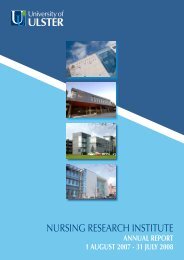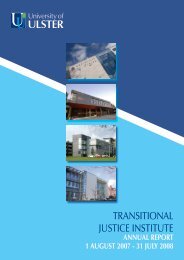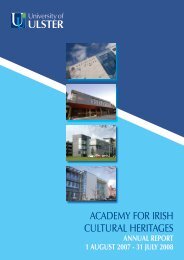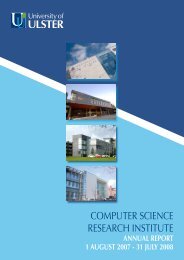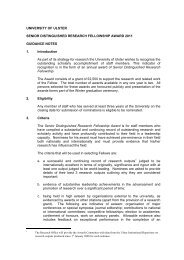Invest NI Procurement Guidelines - Research
Invest NI Procurement Guidelines - Research
Invest NI Procurement Guidelines - Research
You also want an ePaper? Increase the reach of your titles
YUMPU automatically turns print PDFs into web optimized ePapers that Google loves.
I<br />
<strong>Procurement</strong> Guidance Note<br />
PGN 04/12<br />
PROCUREMENT CONTROL LIMITS AND<br />
BASIS FOR CONTRACT AWARDS
PROCUREMENT GUIDANCE NOTES<br />
Northern Ireland Public <strong>Procurement</strong> Policy was approved by the Northern<br />
lre}and Executive in 2002. In approving the policy the Executive took the<br />
decision that legislation was not necessary to ensure that Departments, their<br />
Agencies, nonDepartmentat Public Bodies and Public Corporations complied<br />
with the policy. Instead, it considered that compliance could be achieved by<br />
means of administrative action.<br />
These <strong>Procurement</strong> Guidance Notes are the administrative means by which<br />
the Northern Ireland Public Sector is advised of procurement policy and best<br />
practice developments. They are developed by Central <strong>Procurement</strong><br />
Directorate (CPD), in consultation with the Centres of <strong>Procurement</strong> Expertise<br />
(CoPEs), and are subject to the approval of the <strong>Procurement</strong> Board.<br />
Once endorsed by the <strong>Procurement</strong> Board, they are issued to the<br />
Departments for implementation and copied to CoPEs to develop, if<br />
necessary, procedures supporting the implementation of this guidance in their<br />
particular sector.<br />
CPD is responsible for disseminating advice and guidance to the <strong>NI</strong> public<br />
sector on public procurement policies and for monitoring implementation.<br />
<strong>Procurement</strong> Guidance Notes are also published on Dswebjte.<br />
The following <strong>Procurement</strong> Guidance Note was endorsed by the<br />
<strong>Procurement</strong> Board with effect from 21 May 2012 for use by those<br />
bodies covered by the Northern Ireland Public <strong>Procurement</strong> Policy.<br />
• AERS c
CONTENTS PAGE<br />
1 .0 Purpose 4<br />
2.0 Background 5<br />
3.0 <strong>Procurement</strong> Control Limits 7<br />
4.0 Basis of the Award of Contracts 9<br />
5.0 Contracts for Part B Services 10<br />
6.0 Further Information 11<br />
ANNEX<br />
Annex A <strong>Guidelines</strong> for Purchases up to £5,000 12<br />
Definition of Terminology<br />
In the preparation of this guide, the term contractor/supplier has been<br />
used to denote an organisation that contracts directly with a Department,<br />
whether it is a supplier, a service provider or a construction contractor.<br />
The term Department has been used to refer to those bodies subject to<br />
Northern Ireland Public <strong>Procurement</strong> Policy including Departments,<br />
NonDepartmental Public Bodies and Public Corporations.<br />
The term eScurc.iru...J has beer used to describe the current wei.based<br />
ooa se b e r er No’tn re md b c sec u” = u.e se<br />
tender its available contracts.<br />
The term lowest acceptable price has been used to refer to the lowest<br />
once after unacceptably ow pr!ces have been excluded. Each case should<br />
be treated on its merits, There should be no automatic exclusion and<br />
tenderers whose tenders are considered tc. be significs.ntly low should be<br />
given the opportunity to justify their prices..<br />
I
1.0 PURPOSE<br />
1.1 The purpose of this guidance is to set out the <strong>Procurement</strong> Control<br />
Limits (PCL5) and the basis for contract award for application in all<br />
procurements.<br />
1.2 The PCLs are designed to ensure:<br />
• an effective competition (competition is the best way of achieving<br />
and demonstrating best value for money);<br />
• a balance is struck between the value of the contract and the<br />
transactional cost of undertaking the procurement procedures;<br />
and<br />
• a proportionate approach is taken to procurement for low value<br />
requirements.<br />
2.0 BACKGROUND<br />
2.1 In Northern Ireland, public procurement is a devolved matter.<br />
Annex A of the policy document.<br />
applies to those bodies listed in<br />
2.2 At the heart of Northern Ireland Public <strong>Procurement</strong> Policy is the<br />
achievement of Best Value for Money’ (BVFM) through adherence to<br />
the 12 guiding principles of procurement, Included in these guiding<br />
principles is the principle of competitive supply which states that<br />
procurement shou’d be carried out by competition uniess there are<br />
convincirg reasons to the contrary. Competition romotes economy,<br />
efficiency and €.ffectiveness in nubic: exoen.mture. and also. contributes<br />
the competitiveness of contractors.<br />
E
2.3 All public sector procurement is regulated in the European Union (EU)<br />
through EU Directives. The current procurement directives were<br />
transposed into UK national law on 31st January 2006 as The Public<br />
Contracts Regulations (2006) SI 2006 No.5 (as amended) and the<br />
Utilities Contracts Regulations (2006) SI 2006 No.6 (as amended)<br />
“Regulations”.<br />
—<br />
the<br />
2.4 The Regulations apply to all contracts above a published jcsflQId<br />
which are not covered by an exemption.<br />
2.5 In determining the value of a contract, for the purposes of assessing<br />
whether it is above the threshold, the value of all options and renewals<br />
must be taken into consideration. When a Department has a single<br />
requirement for goods, services or works contracts and a number of<br />
contracts are to be entered into to satisfy the requirement, the value of<br />
the consideration is the aggregate value of all the contracts<br />
1.<br />
2.6 Departments must not split purchases or disaggregate project costs in<br />
order to circumvent the control limits set out in this guidance note.<br />
2.7 The PCLs recommended in this note provide the optimum level<br />
required to ensure that the transaction cost of procurement procedures<br />
is efficient, whilst maintaining a sufficient level of competition to<br />
achieve best value for money, CoPEs may choose to make minor<br />
variations to these limits to suit the particular circumstances of their<br />
business. In such instances, CoPEs should ensure that the Head of<br />
coPE and Accountinç. Officer are made aware of such instances and<br />
the reasons tor the qrocosed actions.<br />
Refer to t.he Publl.c Contracts ReqCation 2006 [as amended) Req. 8 (Ii )41 0) and• the<br />
eC<br />
D55<br />
: r:’a<br />
n d IMIESTORS<br />
5 IN PEOPLE
3.0 PROCUREMENT CONTROL LIMITS<br />
3.1 Goods and Non-Construction Services<br />
3.2 The PCLs set out below are recommended for goods and nonconstruction<br />
services.<br />
Table I — PCLs<br />
Value<br />
Goods and Non-Construction Services<br />
Procedure<br />
Up to £5,000 Departments must demonstrate that value for<br />
money has been secured.<br />
Guidance is attached at Annex A.<br />
£5,000 to A minimum of two tenders invited by the person<br />
£30,000 authorised to procure for their organisations in<br />
accordance with a Service Level Agreement (SLA)<br />
with a CoPE; or<br />
A tender process undertaken by a CoPE,<br />
£30,000 to Advertise on eSourcingNl.<br />
EU Thresholds Tender process must be conducted in line with<br />
<strong>Procurement</strong> Guidance Note 05112: <strong>Procurement</strong><br />
Below EU Thresholds.<br />
Above Advertise on eSourcingNl.<br />
EU Thresholds EU Directives apply —advertise in the Official<br />
Journal of the European Union (OJEU).<br />
r!d<br />
a
3.3 Construction Works and Services<br />
3.4 Construction is a distinct area of procurement, with specialist<br />
requirements and forms of contract, All construction related contracts,<br />
irrespective of value, should be procured through or under the<br />
delegated authority of a construction CoPE or via a Service Level<br />
Agreement with a CoPE in accordance with the following PCLs. CoPEs<br />
may choose to make slight variations to these limits to suit the<br />
particular circumstances of their business (see paragraph 2.7).<br />
Table 2<br />
—<br />
PCLs Construction Works<br />
Value Procedure<br />
Up to £5,000 Departments must demonstrate that value for money has<br />
been secured.<br />
Guidance is attached at Annex A. )<br />
£5,000 to Contractors must be registered on Constructionline<br />
2<br />
£30,000 First six contractors from a randomly selected list<br />
generated by Constructionline are invited to tender.<br />
£30,000 to Advertise on eSourcingNl<br />
EU Tender process must be conducted in line with<br />
Thresholds <strong>Procurement</strong> t.u .dance. Note 05/12: <strong>Procurement</strong> of<br />
_Thresholds.<br />
1<br />
OandBe!ow<br />
Above Advertise on eSourcingNl.<br />
EU EU Directives apply —advertise in OJEU,<br />
Thresholds Normally use the restricted procedure<br />
it<br />
I
Table 3— PCLs Construction Services<br />
Value JProcedure<br />
Up to5,000 f Departments must demonstrate that value for money has<br />
been secured.<br />
Guidance is attached at Annex A.<br />
£5,000 to Consultants must be registered on Construction line<br />
£30000 First six consultants from a randomly selected list<br />
generated by ConstrucUonline are invited to tender.<br />
£30000 to Advertise on eSourcingNl.<br />
EU Thresholds Tender process must be conducted in line with<br />
<strong>Procurement</strong> Gutdance Note 05112: <strong>Procurement</strong> of<br />
Goods Works and S rv ccc 0 e £ 0.000 n Be o<br />
EU Threshoids.<br />
Above Advertise on eSourcingNl.<br />
EU thresholds EU Directives apply —advertise in OJEU.<br />
Normally use the Restricted Procedure.<br />
3.5 Ensuring Consistency and Visibility<br />
3.6 To ensure consistency and visibility in the award of contracts, CoPEs<br />
must use eSourcingNl as the electronic tendering portal for all bodies<br />
covered by the Northern Ireland Public <strong>Procurement</strong> Policy.<br />
4.0 BASIS OF THE AWARD OF CONTRACTS<br />
4 1 Contracts over the EU threshold must be awarded on the basis of<br />
‘d I W s<br />
a uc’ -<br />
e e 3e, n a C tv 3 )<br />
s
- Award<br />
4.2 For contracts for the supply of standard goods, non construction<br />
services or below<br />
EU<br />
threshold construction services and works, the<br />
preferred basis of award should be the lowest price or lowest<br />
acceptable price.<br />
In<br />
this context, “standard” means when the goods,<br />
services or works can be clearly and simply specified, and are capable<br />
of being routinely delivered by a number of suppliers/contractors.<br />
4.3 For more complex or strategic requirements for goods, services or<br />
construction when the performance of a contract is crucial to meet<br />
business objectives, MEAT or BPQ may be used on the advice of a<br />
CoPE,<br />
In<br />
these circumstances the price/quality ratio shall have a<br />
minimum quality element of 30%.<br />
4.4 The price/quality ratio should be selected on the advice of a CoPE. The<br />
rationale for the use of MEAT or BPQ and the price/quality ratio must<br />
be documented.<br />
4.5<br />
All<br />
contracts with a value greater than £5,000 should be awarded on<br />
the Department’s/CoPE’s Terms and Conditions of Contract.<br />
4.6<br />
In<br />
exceptional circumstances<br />
directly, without obtaining quotes or advertising,<br />
Departments should consult ‘PGN 03/11<br />
a Competition’.<br />
it may be necessary to award a contract<br />
in which case<br />
of a Contract Without<br />
•<br />
f••<br />
NVTORS<br />
PEOPLE
5M CONTRACTS FOR PART B SERVICES<br />
5.1 The procurement rules do not fully apply to a Part B Services Contract<br />
as defined in the Regulations. These include services not deemed to<br />
have sufficient cross border interest to warrant full application of the<br />
Directives. The limited provisions that do apply are the requirement to<br />
ensure adequate advertising of any contract, EU compliant<br />
specifications and an obligation for an award notice to be placed in the<br />
OJEU. However the Treaty on the Functioning of the European Union<br />
(TFEU) principle of transparency requires that an economic operator in<br />
another Member State should have access to appropriate information<br />
regarding a contract before it is awarded so that, if it wishes, it would<br />
be in a position to express an interest.<br />
5.2 An Interpretative Communication<br />
3 was issued by the European<br />
Commission in 2006 to inform Member States that, in order to satisfy<br />
the principle of transparency, a level of advertising for all contracts,<br />
including Part B Services and below threshold, is required for contracts<br />
which would be of interest to economic operators in other Member<br />
States, “in particular in view of its subject-matter and value and of the<br />
customary practices in the relevant sector’, This should be taken into<br />
consideration by CoPEs when applying the <strong>Procurement</strong> Control<br />
Limits. It is considered that in most cases it should be sufficient to<br />
advertise on the eSourcingNl portal, unless for a very high value Part B<br />
Services Contract, or in the case of subject matter which is so limited<br />
that it needs to be advertised very widely in order to attract sufficient
6.0 FURTHER INFORMATION<br />
61 Any queries on this <strong>Procurement</strong> Guidance Note should be addressed<br />
to:<br />
Central <strong>Procurement</strong> Directorate<br />
<strong>Procurement</strong> Policy Branch<br />
2 Floor East<br />
Clare House<br />
303 Airport Road West<br />
BELFAST<br />
BT3 9ED<br />
Phone: 028 9081 6518<br />
e-mail:<br />
All <strong>Procurement</strong> Guidance Notes can be found at<br />
k,cDo<br />
c.•
GUIDELINES FOR PURCHASES UP TO £5,000<br />
Annex A<br />
Purchases up to £5,000 will be classified as procurement expenditure but they<br />
are not subject to procurement rules. Departments must ensure that all<br />
purchases up to £5,000 are subject to value for money considerations and<br />
Managing Public Money Northern Ireland.<br />
Departments should ensure that:<br />
(I) the purchase is not covered by an existing framework agreement, call-off<br />
contract or e-catalogue;<br />
(ii) the purchase is a one-off requirement;<br />
(iii) the total spend is up to £5,000; and<br />
(iv) the requirement is clearly specified.<br />
When existing arrangements at (I) are not available, then departments should<br />
carry out a price check<br />
4 with at least two contractors/suppliers to ensure value<br />
for money has been achieved. Price checks should be documented and<br />
retained on file for audit purposes.<br />
In the exceptional circumstance when it is not possible to obtain price checks<br />
(eg, emergencies) then an order may be placed directly with a<br />
contractor/supplier. In these cases, Accounting Officer approval is not<br />
required when the total spend is up to £5,000 but the reasons for the action<br />
should be recorded and retained for audit purposes.<br />
This derogation does not apply to the procurement of consultancy<br />
services.<br />
t tNVTORS<br />
IN PEOPtE



